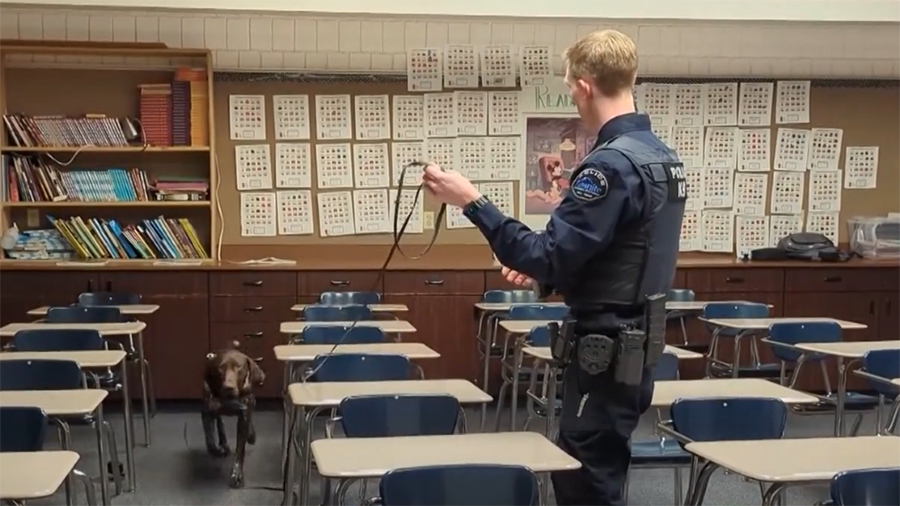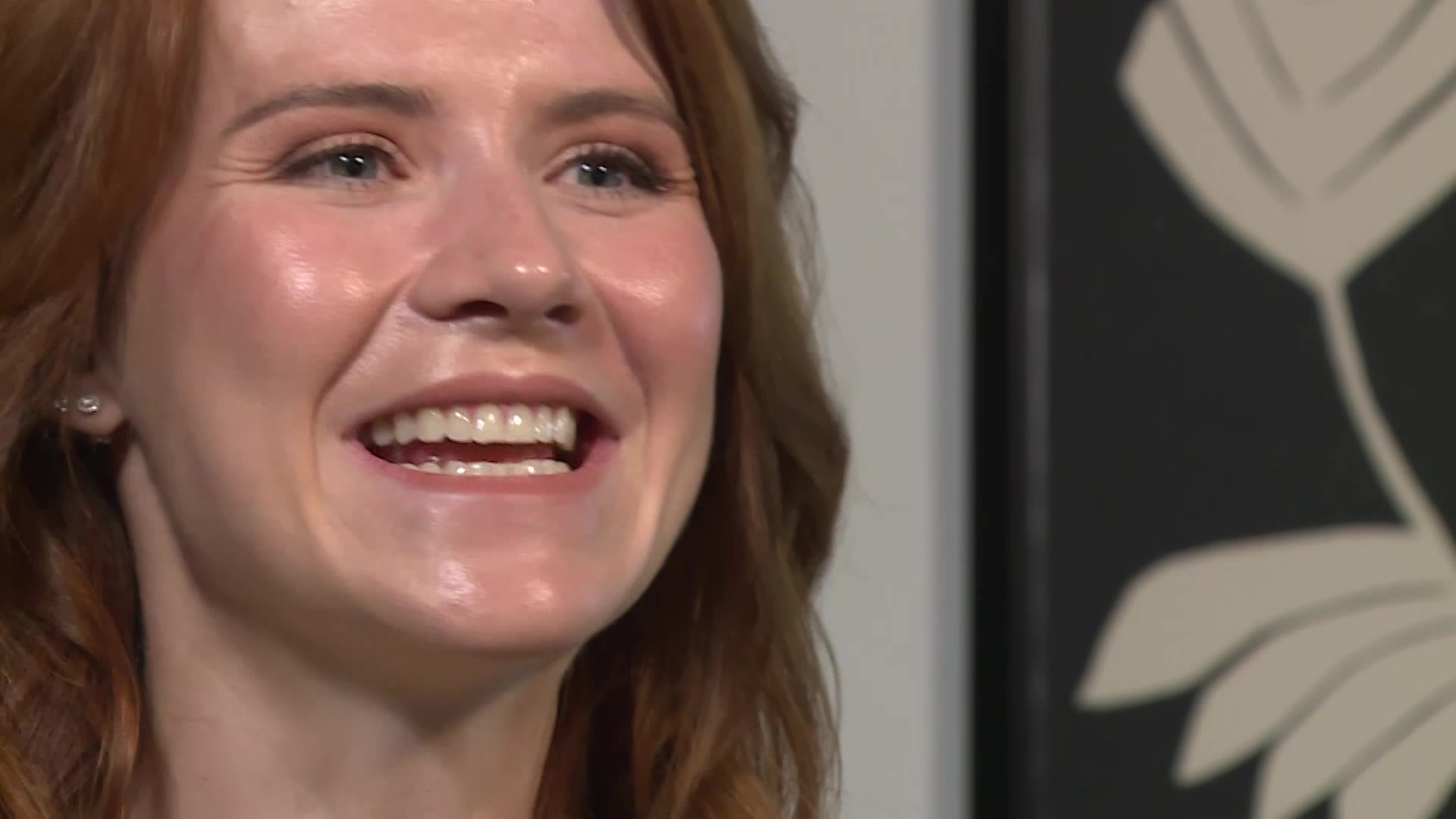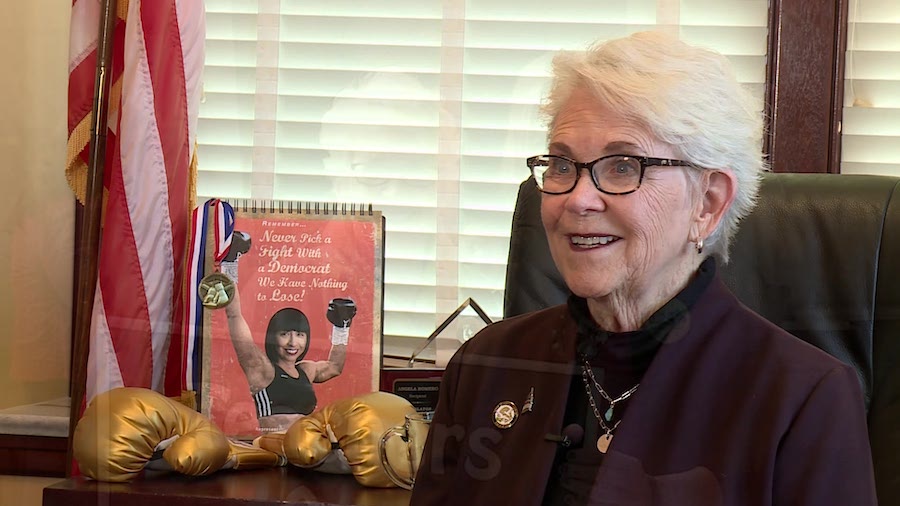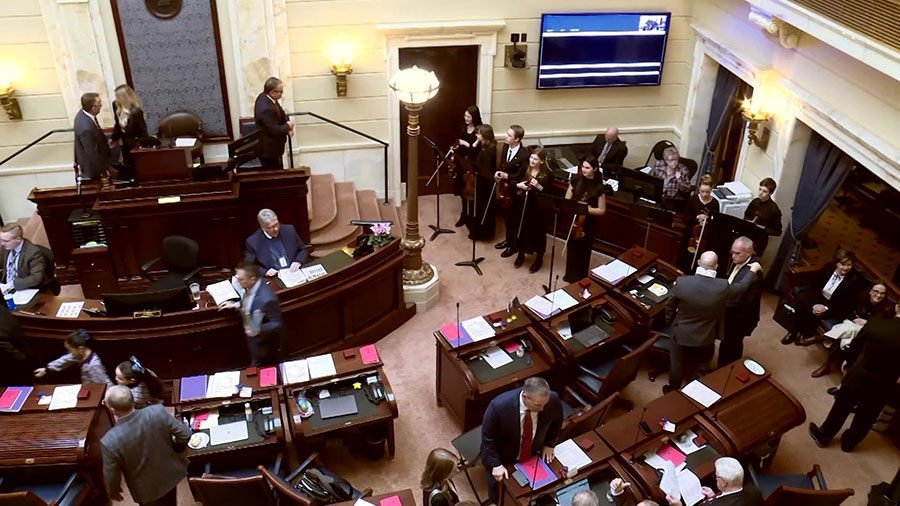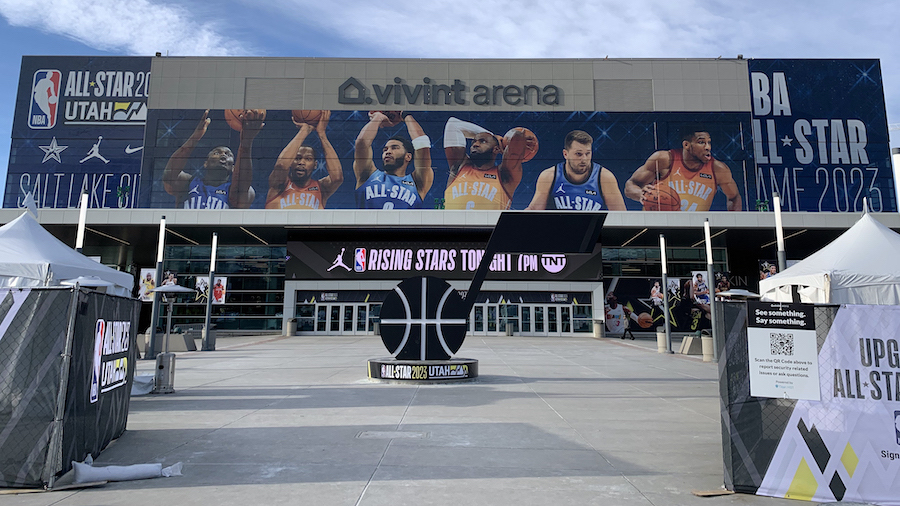KSL+: Talking to your kids about race
Nov 24, 2021, 1:04 PM | Updated: Aug 15, 2022, 11:17 am
Parent: This could have been solved years ago, if we just had been taken seriously.
Matt Rascon: This week on KSL+…
Parent: I hope the school board and the school district takes this opportunity. No, don’t just see it as a punitive measure takes the opportunity to make the changes in the lives of the kids.
Matt Rascon: A school district under fire.
School official: We don’t and have never pretended or suggested that we don’t have racism in our schools just like we have it in society.
Matt Rascon: After a two year investigation, the US Department of Justice found serious and widespread racial harassment in Davis schools.
School official: We apologize any student who comes to our schools, feeling like this is not a place I want to be, is not our goal.
Matt Rascon: On the heels of that investigation, the district is offering condolences to the family of one of its black students. The family just buried their 10 year old daughter Izzy, who they say took her own life after she was bullied at school over her race and autism.
Mourner: We need to do some training at home. We must do better for our black and brown and neuro diverse and disabled children. Enough is enough.
Matt Rascon: I’m Matt Rascon and this is KSL+. This week we’re talking about racism in schools and one districts struggle to respond.
You may remember the case that got the ball rolling, a mixed race student had a bus driver close the door on his backpack, dragging him several feet before opening up again. The Department of Justice launched an investigation into allegations of racism at Davis School District in July 2019. Under the Civil Rights Act, in September this year, the DOJ said investigators found widespread racial harassment of Black and Asian American students.
School official: We accept the findings of the DOJ and own that and take responsibility for that. And we feel it our responsibility to change
Matt Rascon: The abuses include hundreds of instances of the use of racial slurs, physical assaults on black students at dozens of Davis schools, school staff disciplining black students more harshly than their white peers for similar behavior and denying black students requests to form student groups while granting requests from other students. Parents and students reported this behavior was so common, they expected it to happen. And the investigation found the school district persistently failed to respond to reports of race based harassment. It doesn’t take long to scroll through comments on social media to see former students sharing their experiences of racism in schools in Davis County and beyond.
So what tools can we give our students to help them combat racism they see in their schools. KSL+ producer Shelby Hintze spoke to Jasmine Bradshaw.
Jasmine Bradshaw: I am an anti-racist educator and I teach parents how to raise anti-racist kiddos and families.
Matt Rascon: She’s the host of the podcast First Name Basis, about what we can do to end this cycle.
Jasmine Bradshaw: I used to be a teacher. And after I left teaching to have my children, I was researching anti racist teaching. And I thought I need this as a mom. And so as I was doing that research that was about almost six years ago, now I decided, what would it look like for me to kind of become that expert and share this information with parents in a way that is digestible and understandable and actionable.
Shelby Hintze: What was the personal motivation behind doing this for you? Was there was there a personal motivation?
Jasmine Bradshaw: Yeah, absolutely. So I grew up in the suburbs of Arizona, and I was always one of the only in my class, I’m black, biracial. So my mom is white, and my dad’s black. And it was just really tough. I was telling you just before we hit record that even though this is a report out of Utah, I feel like if they did this investigation at my high school, they would have found the exact same theme. And so as I have moved through my life as a black biracial woman living in predominantly white spaces, there have just been so many things where I felt like I wish people would have acted differently, and it’s hard.
But then one time when my daughter was really small, I was at a book club, and somebody said the N word. And she wasn’t calling me the N word, but she was just saying it referring to something else. And I was like, Did I just hear that like, that’s no, she didn’t say that. And then she repeated it. And instead of doing something, everybody looked at me and I was like, How is it possible that you all are looking at me to handle this? So that was when I was like, Like, okay, like, I remember going home holding my baby because she was so waking up in the night and thinking, I don’t want this for her. Like, I don’t want her to be sitting at book club and have to be the one to speak up when somebody says the N word, I want the people around her to know what to do. I think they were all my friends. And so they weren’t trying to hurt me. But they just literally had no idea what to say.
And so I thought, if I can put this information into a place where people can feel like it’s a really low barrier to entry, like a podcast, they can hear it in their headphones and take in what they need to take in. And I don’t have to have this conversation 30,000 times with all of my different friends, right? And so I’ve always I’ve told all of my black friends, like, Okay, you guys, this is for us, so that you don’t have to have this conversation over and over, take this podcast and send it to the people who need to understand it. And they have told me like, Oh, this is so good, because it’s so hard to have these emotional conversations over and over again. And then people can really work through it on their own before they come to us and start asking those questions.
Shelby Hintze: So when I have been doing reporting on race and things like that, recently, we’ve been talking a lot about systemic problems. You know, I, I say like, you know, most people would say, you know, I would never say the N word to someone, or, yo, I try really hard to not, um, you know, be unkind to individuals. But then we have systemic problems. But then we see this out of Davis County this week, showing that no, we are still having a lot of those real, blatant, overt, racist issues. And so what would you say, first to parents who want to talk to their kids about this, and want to make sure that they understand why that’s not okay. Especially if they are white themselves. We’ll start there, and then kind of go from there.
Jasmine Bradshaw: Yeah, so I think you make such a good point that we talk a lot about systemic racism. And I’m really glad. Because I think people don’t necessarily understand that it’s the people who make up the system. So it’s not like this system is just happening, like we’re part of it. And so we can be part of taking it apart, and putting together something that is beneficial for and more beneficial for everybody. But when it comes to these situations, I mean, you know, we read the articles, it was talking about derogatory names and pulling hair and talking about slavery, and lynching. All of those things are conversations that happen around the dinner table. Those are really actionable things that we can talk to our kids about. And it takes us starting that work ourselves and understanding Well, why why is saying and it’s such a big deal. Even if you’re joking, even if you’re not calling someone it, it is so hurtful to us. And it’s an act of violence, right? And so, I think when parents start to understand the history behind these things, and start really with themselves, because how can you teach your kids something that you don’t necessarily understand. And so it definitely starts with you. But then it, it comes to that situation where you’re really telling your kids, these are our values as a family, I think you have to tie it back to it’s the same thing when you’re talking about integrity and respect. All of those things that you intentionally teach your children, you have to intentionally teach anti racism. I have a friend, Alex Scott, and she’s always like, we don’t tell our kids to brush their teeth one time. Like, we have to tell them every night brush your teeth, brush your teeth, brush your teeth, right? And so when we’re thinking that our kids are understanding, okay, we don’t we don’t want to be racist in our family. Well, have you had that conversation once? That’s not enough, you have to be consistently over time teaching these values, and it comes through I just think of it like little grains of sand in an hourglass, as you put those grains of sand in, it will really build up into something that they can reach back on when these things happen. So it’s not just them saying it. It’s the people hearing it too, right.
Like there are kids, I’m sure standing around listening to the other kids say this. What how can you practice? Can you talk about how your kiddos are going to respond when someone makes a racist joke, or sit call someone the N word. And my number one favorite tip to teach children and adults honestly, is when you hear something racist, approach it with curiosity. And it really disarms people, and then helps them see the problem with their behavior. Like if someone makes a racist joke, you literally just have to say, wait a minute, why is that funny? And that’s like, nobody wants to explain themselves. And so that just kind of takes the air out of the situation and they understand what’s wrong with it, and then you can move on or if somebody says the N word you can say, Why would you think that’s okay to say, putting like the responsibility back on that person? really helps make progress.
Shelby Hintze: In marketing, you have your love group, your hate group and a swing group. So you have the people that are totally on your side, people are never gonna be on your side as people you can bring, either, right? Yeah. And how can people figure out who they’re going to be able to persuade? And when is it time to say, you know, this, I just need to not be friends with you, or we need to take a step back. I think people get really worried about that, too. They don’t want to say, Well, I’m not going to be your friend now. Um, but I think that, like you said, it’s a value, as well. And that’s what friendships are built built on. So that was a convoluted question. But hopefully you have some ideas.
Jasmine Bradshaw: No, I totally hear you. Especially when I think about, you know, all of the people who feel like they’re fighting against anti racism right now, which is literally my job. So it’s like, kind of scary. But then I remember that, like, Martin Luther King was like one of the most hated men in America when he was assassinated, right, I’m not comparing myself to Martin Luther King, but it just inspires me to know that, like, there can be lots of people on the other side, and we can still achieve great change. So that hopefully, is a little nugget of hope. But when I’m thinking about like, relationships and boundaries, one of the biggest things I tell people is that it is important that you stay in relationships, because if you leave, then who are they going to have to push back on those ideas. And obviously, you have to take care of yourself, especially if you’re a person of color, like you owe nobody anything, definitely you can cut people off and not feel bad about it, because that’s racism and, and it’s okay to separate yourself from that. But if you’re a person who holds white privilege, like part of spending your privilege is being in those situations, putting yourself in that space, so that people are kind of unnoticed. And you can be very clear about your boundaries. Like, I don’t tolerate racist jokes, you can’t use derogatory names around me. And it’s just a matter of like repeating yourself every time something comes up. But I always tell people, like you don’t know what seeds you’re planting.
Shelby Hintze: Does teaching empathy, play into anti racism work? And because I think a lot of people just they can’t imagine they’ve never experienced it themselves. Or they see, like, for me, I use a wheelchair. And so I have daily things that happen. And somebody may only see the one thing and think, Well, that’s not a big deal. But when you put them all on top of it, let’s talk a little bit about that first, that that kind of constant barrage of. And it’s not just the one time the one thing that you saw,
Jasmine Bradshaw: Yes, absolutely. So that I’m sure you know this, but they have a term for it. It’s called microaggressions. But all of us who are anti racist educators, I just made an episode a few weeks ago called not so microaggressions. Because one of the women that I have learned from and have followed for a long time, her name is Britt Hawthorne. And she says there’s nothing micro about a microaggression. And it’s just these little things, like people putting their hands in your hair, or people crossing the street when they see you walking by and just all these different things that tell you that you don’t fit that you’re an other that you’re an outsider. And I’m sure you understand what I’m talking about. And it just it’s not. It’s not as obvious to people, but it just the buildup of it is absolutely exhausting. And there’s been research about the mental health of black people in America and how they have, you know, higher rates of depression, suicidal ideations, like all of these really awful things are happening because of a lot of factors, but microaggressions specifically have been tied to mental and physical health issues. So I think that when people are like, Oh, it’s, you know, it’s just one time, there are times that I have experienced being called a derogatory name, you know, in high school, and I still am thinking about that and worrying about that. So even though people don’t, can’t necessarily see it themselves, because they’ve never experienced it, I think the research speaks for itself in the effect that it’s having on people. Yeah.
Shelby Hintze: And how can people become more understanding of people’s experiences that are different from their own?
Jasmine Bradshaw: Um, well, the first thing is just listening, like listening with a mind open to understand what you know what they’re going through instead of listening to respond, like just listening to take it in. And then the other thing, I mean, you asked me a little bit about empathy. I think, when we think about empathy, hearing stories, it has to be coupled with responsibility. I mean, you hear these stories, and you have to think, okay, how can I be an agent for change in this situation, because I promise you, there’s something you can do in your community, whether you’re a parent talking to your kids in your home, whether you’re a child, I’m at school, and you’re using your voice. And we have a saying in my house, it’s you’ll never get in trouble for doing the right thing. So kids need to understand that sometimes, I mean, we read this in that article, and I’ve experienced it when I was in high school, that the teachers are not always going to make the right choices in this situation. So even though those people are in authority, if you teach your children that they need to be in solidarity with people of color, and speak up when something happens, then they need to understand that you’re going to have their back, right. Like there was something that happened to me in my Spanish class where my teacher said, he was teaching us vocabulary words, and they were like chores, and he said, aka women’s work. And I said, that was pretty sexist. And he was like, I mean, say, after class. And so I go to his desk, and he’s like, do you want me to tell the principal what you said? And I said, Do you want me to tell the principal what you said? And somebody asked me one time, how did you do that? Like, weren’t you scared. And of course, I was scared. My heart was beating really fast. I was in high school. But at the same time, I remember thinking, not really, because I knew my parents would. That’s what they modeled for me was speaking up when people say those things. So I knew I wouldn’t get in trouble, because that’s what my parents taught me to do. So I think it’s when you’re sitting down and teaching those values, it’s not just oh, yeah, say something. It’s, it doesn’t matter if that person has authority. You have responsibility here. Yeah,
Shelby Hintze: And I wonder how much of that in those issues in Davis County specifically. You know, we’re just because people were like, well, the teachers and doing anything about it, so it must not be a big deal. And, and that kind of bystander effect to once when one person jumps in, it makes it a lot easier for other people to jump into, um, who should be doing anti racism work?
Jasmine Bradshaw: Great question. I mean, we specifically need to be focusing on people who hold white privilege, white people need to be doing anti racist work. And black people have their own internalized oppression that they have taken on as a means of survival, there are a lot of things that we say are okay, or jokes that we will make just because we don’t want to be the outsider. And we want to be like one of the cool ones, or one of the good ones, one of the ones that you’ll be willing to be friends with, right. And so we have like internal like healing to do. But when it comes to the unlearning, and the huge action taking, that needs to be on the shoulders of people who are white, because they also are the ones who hold the most systemic power. And that means that they can really help with the systemic changes.
Shelby Hintze: So what would you say to somebody that say, Well, I’m not racist? I don’t need to do this. And because I mean, I would never say that my kids would never say that. They don’t even know that. What would you say to those people?
Jasmine Bradshaw: I think that we don’t necessarily need to be categorizing people as racist, because that is where people kind of get themselves into trouble. They think of it as this binary of like, I’m either racist, or I’m not, and I’m not, so I don’t have anything to do. But in reality, everyone has internalized racism at some point, whether it be you know, this internalized oppression that I was talking about, that black people hold and have to heal from, or the internalized racism that comes out in racist actions and things that they say. So instead of thinking of it as like, I’m either wholly racist, or I’m wholly not racist. It’s thinking about it with within, like different actions, like sometimes you’ll do or say something racist. And I promise you, if you’re a white person that has happened, like you might think you might not remember it, but if you have a friend who has a person of color or something, and they’ve probably either told you or if they haven’t told you, that means that they don’t feel comfortable telling you and that’s something that you need to examine, too. So I’m not saying that you are some horrible racist person, but I’m just saying the likelihood that you’ve never done or said anything racist is basically none. So you need to work on that internal work, and then also being proactive because the systems of racism are always working. Right. And so, Beverly Daniel Tatum, Dr. Beverly Daniel Tatum always says the only thing we have to do for racism to continue is nothing. So if you’re not doing anything, you are actually being part of the issue because it’s always an ongoing system.
Shelby Hintze: I was just listening to the Southlake podcast by NBC and one of the girls talked about how she a kid in her class at the N word, and, and you mentioned it as well, like, remembering that to this day, and she was like, and I knew that kid went home and forgot about what had happened. And she’s like, here I am Three years later, still talking about this. What impact does that have on someone’s mental health, physical health, ability to learn? You know, what are some of the research show? For? What? What the weight of that carries?
Jasmine Bradshaw: Yeah, um, that’s such a good question. And it really has to do with like this feeling of being othered. Or if you belong, like, whenever we go into spaces as human beings, we’re looking around ourselves to see, do I belong in this space? Right? We talked about it a lot with teachers in their classrooms, if you’re if a child walks into their your classroom and only sees white historical figures on the wall, are they going to feel like they see themselves reflected? Are they going to feel like they belong in that space. And I feel like the N word is the ultimate proof, I guess, that a lot of white people will use to say you don’t belong, and you are lesser. And it’s not just about that moment, and how much it hurts in the moment, I’m sure that girl who went back to school, the next day was absolutely worried about it happening again. And, and we are always feeling like we have to prove ourselves. When I was growing up, my dad used to say, we have to work twice as hard for half as much because of the biases that people hold against us just by seeing us or just by reading our names on a resume, right? There’s so much research about how much harder it is for people to get home loans or black, how much harder it is for people to get jobs who are black. And so you think that oh, yeah, like just saying it this one time is a one and done thing. But it’s not just that it affects you, it’s affecting all the other students too, because they’re seeing, okay, this person said this, and there really wasn’t that big of a reaction. So it must not be that big of a deal. So you’re training not only the black people to be nervous about that space and feel super unsafe. But all of the other kids there are thinking, Okay, this is a space where I don’t have the responsibility to act, or I don’t think it’s that, you know, it’s a huge thing. So I think that people don’t quite understand the long term effects. And I promise you, that’s not the only time she’s been called the N word. So it’s just that constant reminder of like, you are lesser you are other.
Shelby Hintze: Is there anything else? I always asked this, this last question, and then like, come up with three more. So is there anything else that you think is important, or you want people to understand that we haven’t talked about?
Jasmine Bradshaw: I think the biggest thing I want people to take away is that anti racism doesn’t mean that you’re an America hater. That’s one of the biggest things I’ve heard is like you hate America. And I think the hardest thing for me to hear is that we are America haters. Because, you know, there’s that James Baldwin, quote, where he talks about, I love America so much that I criticize her at every turn, because of how much I love her. I’m butchering it, but you know, he’s talking about that. And that’s how I feel when we say all people are created equal. And we’ve never ever lived up to that fact. And when we created this country, it’s our responsibility if we are patriots to hold our country to what we say our values are. So I think the biggest thing when people are thinking about whether or not they’re going to participate in anti racism and really dig in, is what are your values? And is your behavior aligning with that if you say that you’re not racist, it means you have something to do about it, you know. So I think that that’s the biggest thing for me is looking at your values, and then really aligning your behavior and understanding that when you do that, like you can feel secure in yourself and confident in the journey that you’re on. And also understanding that just because you’re studying anti racism doesn’t mean you’re not going to make mistakes. That’s part of it. It’s like a muscle that you’re building up over time. When you first start going to the gym. It’s like oh, this this hurts, this is really uncomfortable. And as you keep going, it gets easier you get stronger, but that doesn’t mean that it’s not hard to go to the gym, you know.
Matt Rascon: The Davis School District and the department justice ultimately came to a settlement promising big changes toward better treatment of students of color. Among those changes. The school district agreed to create a new department to handle complaints of race discrimination, and train staff on how to identify and respond Those complaints, inform students and parents how to report harassment and discrimination and create a centralized electronic reporting system to track and manage complaints. And Davis’s response to complaints.
It is tough. You know, it’s we have great pride in our educators in our families, and great faith in them. And we have no doubt that they can do that.
Now in regards to the death of 10 year old Izzy. The district said independent team would investigate the allegations that she was racially harassed and discriminated against. The district also said it was working to diversify its workforce to better reflect the diversity of the school district. More than 15% of students are minorities. That does it for us this week here on KSL Plus, I’m Matt Rascon. And we’ll see you again next week.

